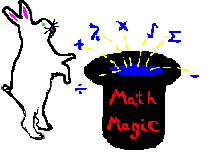

A. Logarithms, usually called logs, can be a little complicated since there are so many properties to learn. To become good at the log problems requires lots of practice.
B. There are 2 basic logs: logn and loge (which is written as ln and means "natural log").
1. In general, logb x = n means bn = x and ln x = n means, en = x.
2. If no 'b' is given, then it is assumed the value 10.
Ex [1] log 1000 = _______
a. Since no value 'b' is given, b = 10.
b. The problem is 10x = 1000. For this to be true, x = 3.
c. The answer is 3.
Ex [2] log4 x = 3/2, then x = _____
a. The answer is 43/2 = x or 8 = x. The answer is 8.
Ex [3] logb 81 = log2 16, then b = ______
a. This means blog216 = 81. So the first thing to do is to find log2 16 which means 2x = 16. So x = 4. So log2 16 = 4.
b. So substituting we get b4 = 81. So b = 3.
c. The answer is 3.
C. Properties Of Logs:
1. Below are the common properties of logs. All of these should be memorized and you should be very familiar with knowing how to manipulate them.
| logn n = 1 | logn 1 = 0 | log a + log b = log ab |
| log a - log b = log a/b | nlogn a = a | logn (1/x) = -logn x |
| logna x logan = 1 | log na = a x log n | logn x = log x/log n |
2. There might be other properties, but these are the ones that show up on the number sense tests the most.
D. Examples Taken From Past UIL Tests
Ex [4] log4
27 ![]() log4 3 = _________
log4 3 = _________
a. In this problem, if we can make the 1st term be log4 3 then the problem would be easy.
b. Change log4 27 to log4 33 = 3*log4 3.
c. So now we
have 3 x log4 3 ![]() log4 3
= 3 x 1 = 3.
log4 3
= 3 x 1 = 3.
d. The answer is 3.
Ex [5] ln 5 + ln 8 = ln 10 - ln x, then x = ______
a. ln 5 + ln 8 = ln 5*8 = ln 40.
b. ln 10 - ln x = ln 10/x.
c. So we have ln 40 = ln 10/x. The only way for this to be true is if 40 = 10/x. So, solving for x we get x = 1/4.
d. The answer is 1/4.
Ex [6] (log2 7)(log7 4) = _______
a. We know that (logb a) (loga b) = 1. So we need to change the 2nd term to be log7 2 to use this property.
b. Change log7 4 to log7 22 = 2*log7 2.
c. So we have 2 x log2 7 x log7 2 = 2 x 1 = 2.
d. The answer is 2.